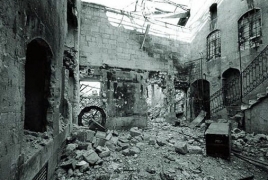Official says what happened in Syria is Turkish aggression February 10, 2016 - 08:32 AMT PanARMENIAN.Net - Damascus aims to secure Syria's border with Turkey and recapture the city of Aleppo with its latest military offensive, a top adviser to President Bashar al-Assad said on Tuesday, Feb 9. In an interview with Reuters in her Damascus office, Bouthaina Shaaban held out little hope for diplomatic efforts to end the five-year civil war, says that proposals for a ceasefire were coming from states that "do not want an end to terrorism" and wanted to shore up insurgents who are losing ground. The Syrian army, backed by Russian air strikes and Iranian and Lebanese Hezbollah fighters, has launched a major advance in recent weeks near Aleppo, once Syria's biggest city, now divided between rebel- and government-held sectors. The offensive, one of the biggest shifts in momentum of the five year civil war, has brought government forces closer than they have been in years to a border crossing with Turkey that has served as the main supply route into rebel-held territory. There would be no letup in an army advance, which aimed "to liberate cities and villages that were controlled by the terrorists for 3-1/2 years, and also an attempt to liberate the city of Aleppo from the crimes of terrorism", Shaaban said, according to Reuters. Damascus intended "to control our borders with Turkey, because Turkey is the main source of terrorists, and the main crossing for them". Tens of thousands of people have fled the area, and Turkey, which has already taken in 2.5 million Syrian refugees, has so far mostly kept the border closed to them, despite UN calls to allow them to flee. Shabaan said Turkey was using the refugee crisis to blackmail European states, criticizing Ankara and its "Ottoman ambitions" as the prime cause of the war that has driven 11 million people from their homes and killed 250,000 people. The Syrian army and its allies have gained ground in recent weeks in the provinces of Latakia and Aleppo, which border Turkey to the north, and Deraa, which borders Jordan to the south. They have also advanced against Islamic State to the east of Aleppo. "We hope that the operation will continue in the north until we control the borders and stop the terrorists who Turkey has since the start of the crisis worked to send to Syria," Shabaan added. Asked if military operations would continue at the same pace, she said: "Certainly, God willing". UN-led efforts to launch peace talks in Geneva last week were suspended as the government offensive gained ground. UN envoy Staffan de Mistura aims to reconvene the talks later this month. However, diplomats say they have little hope for a resumption of talks as long as the Russian-backed government offensive is under way full bore. Shaaban said she did not expect success for diplomacy, saying the problem remained one of foreign support for militants in Syria and if there had been "a real international desire" to end the problem the crisis would been resolved years ago. "The states that support terrorism in Syria, behind the financing and weapons, did not take a decision to halt this financing and arming, and therefore we do not see success for the diplomatic efforts", she said. Alongside Turkey, Saudi Arabia has been a major sponsor of the insurgency that grew out of an uprising against Assad's rule. Shaaban said Turkey was primarily responsible for the conflict and refugee crisis, because it "was the one that attacked Syria", and it was now seeking to gain from the issue by demanding membership of the European Union and financial incentives. "The solution to the refugee crisis is via the return of security to Syria, and I am confident that the majority of Syrians dream of returning to their country," she said. "What happened in Syria is a Turkish aggression, and therefore with all sincerity I say to the European and Western states that Turkey is the problem. The Erdogan government is the problem, and cannot be part of the solution." Photo: Hagop Vanesian Authorities said a total of 192 Azerbaijani troops were killed and 511 were wounded during Azerbaijan’s offensive. In 2023, the Azerbaijani government will increase the country’s defense budget by more than 1.1 billion manats ($650 million). The bill, published on Monday, is designed to "eliminate the shortcomings of an unreasonably broad interpretation of the key concept of "compatriot". The earthquake caused a temporary blackout, damaged many buildings and closed a number of rural roads. Partner news |